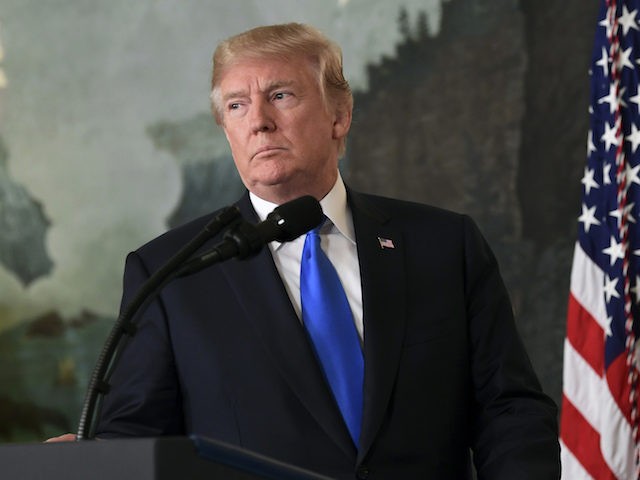WASHINGTON, DC – President Donald Trump announced Friday he will not certify Iran’s compliance with the Iran deal, effectively putting the ball in Congress’s court on whether to end the deal.
“I am announcing today that we cannot and will not make this certification. We will not continue down a path of whose predictable conclusion is more violence, more terror, and the very real threat of Iran’s nuclear breakout,” Trump said in a televised statement from the White House.
“History has shown that the longer we ignore a threat, the more dangerous that threat becomes,” he said.
Trump’s decertification now means Congress has 60 days to decide whether to reimpose sanctions that were lifted as part of the deal with Iran, reached under the Obama administration in 2015 and known as the Joint Comprehensive Plan of Action.
If Congress imposes sanctions, it could be seen as a breach of the deal, and the U.S. may no longer be a party to the deal. If Congress does not impose sanctions, the deal could remain intact.
Trump said he has directed his administration to work with Congress to strengthen the deal and that some members of Congress are already working on a proposal.
But Trump surprisingly also announced that, if the White House and Congress are not able to reach a solution, he will “terminate the deal.”
“In the event that we are not able to reach a solution … then the agreement will be terminated,” he said.
The statement surprised and pleased supporters of ripping up the deal who feared the administration was not going far enough.
“Clear threat to terminate. I didn’t think he would go there,” tweeted Jonathan Schanzer, senior vice president of research at the Foundation for Defense of Democracies.
Trump also announced additional sanctions against the Iranian Revolutionary Guard Corps, Iran’s elite military force.
Trump framed his decision as part of a complete review of U.S. strategy on Iran, which he called a “fanatical regime.”
“This radical regime has raided the wealth of one of the world’s oldest and most vibrant nations, and spread death, destruction and chaos all around the globe,” he said.
He outlined Iran’s long history targeting Americans in the Middle East and around the world, its support for terrorist groups, funding of sectarian violence, support for the Syrian regime, and its threats against the U.S. and Israel.
“Given the regime’s murderous past and present, we should not take lightly its sinister vision for the future. The regime’s two favorite chants are ‘Death to America’ and ‘Death to Israel,'” he said.
He also slammed the Obama administration for providing relief to Iran from crippling sanctions that he said would have toppled the regime.
Trump recalled the administration’s agreement to provide Iran with a $1.7 billion cash settlement, which a part of was loaded onto pallets and flown into Iran.”Just imagine the sight of those huge piles of money being hauled off by the Iranians waiting at the airport for the cash. I wonder where all that money went,” he said.
Trump said he wanted to address the deal’s “many serious flaws,” including its sunset provisions that in “just a few years will eliminate key restrictions” on Iran’s nuclear program.
Other flaws include “insufficient enforcement and near total silence on Iran’s missile programs.”
“Congress has already begun the work to address these problems. Key House and Senate leaders are drafting legislation that would amend the Iran Nuclear Agreement Review Act to strengthen enforcement, prevent Iran from developing … an intercontinental ballistic missile, and make all restrictions on Iran’s nuclear activity permanent under U.S. law.”
Trump evoked the specter of another North Korea — who is on the path toward obtaining a nuclear weapon that can hit the U.S., which three previous administrations had struggled to counter.
“As we have seen in North Korea, the longer we ignore a threat, the worse that threat becomes. It is why we are determined that the world’s leading sponsor of terrorism will never obtain nuclear weapons,” he said.
Sen. Tom Cotton (R-AR) is already working on a proposal to strengthen the Iran deal with Senate Foreign Relations Committee chairman Bob Corker (R-TN).
His bill would require the automatic “snapback” of U.S. sanctions should Iran violate “enhanced and existing restrictions” on its nuclear program or go under a one-year “breakout” period from obtaining a nuclear weapon, according to a fact sheet.
It would make those restrictions on Iran’s nuclear program permanent, getting rid of the deal’s sunset provisions that begin easing restrictions by year eight and eliminate them by year 15.
It would also bolster IAEA verification powers and limit Iran’s advanced centrifuge program.
“The legislation would not conflict with the JCPOA upon passage. Instead, it would set conditions that halt Iran’s nuclear program and provide a window of time for firm diplomacy and pressure to work,” the fact sheet said.

COMMENTS
Please let us know if you're having issues with commenting.